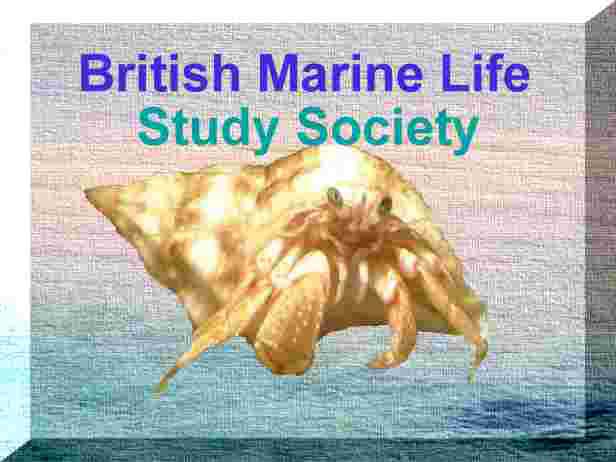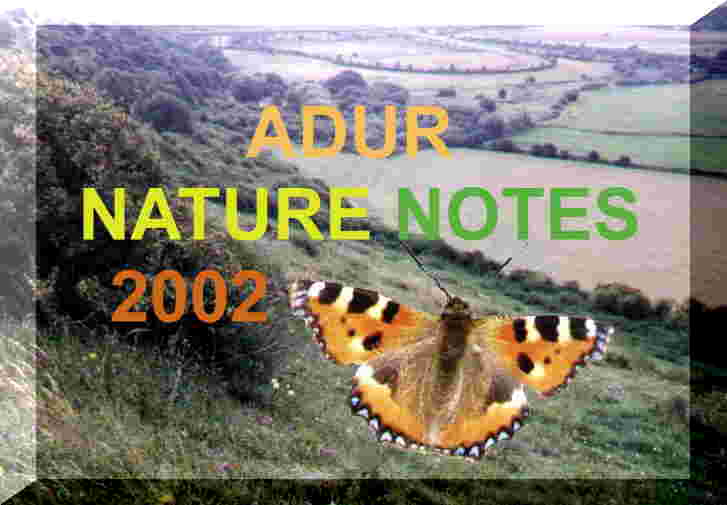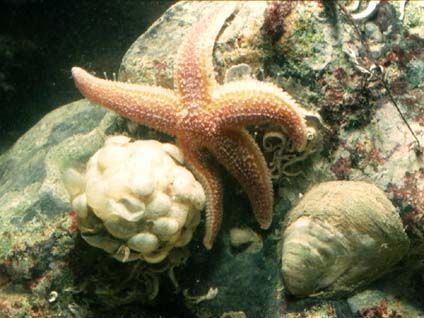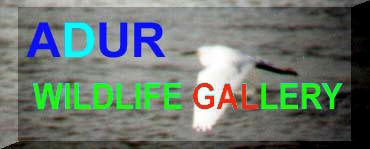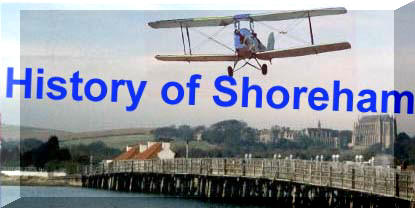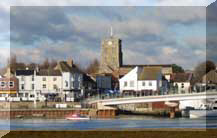
|
NEWS BULLETIN FOR THE ADUR VALLEY |
| LOCAL
ORGANISATIONS |
| LOCAL RESIDENTS PAGE |
| Adur Flood Plain |
| Chalk Downs |
| Coastal Fringe |
| Intertidal (Seashore) |
| Nature
Notes for
Lancing Ring |
| River Adur Estuary |
| River Adur |
| Sea (off Sussex) |
| Town & Gardens |
| Widewater Lagoon |
| AREA MAP |
| Shermanbury (Adur Valley) |
| WSCC LIBRARY |
|
|

This is the first published
Electronic Newspaper for
Shoreham-by-Sea and the
Adur Valley & District, West Sussex, England
Local NewsSouth Downs National Park
If you have been to the Road Show, there is still a chance to make your
opinions known. The Countryside Agency have an automatic response form
on-line.The best page for comments is:
http://www.countryside.gov.uk/proposednationalparks/sd_ca90.asp?type=SD
Countryside Agency Acrobat File
The latter is an Adobe Acrobat file.
For latest discussions see the Adur Valley EForum.
The deadline for comments is 28 February 2002.
Weather Forecast
Please send any comments to: Andy Horton
Glaucus@hotmail.com
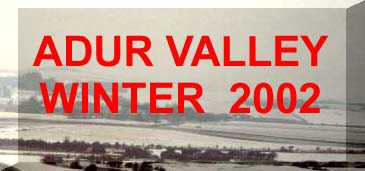 |
 |
 |
 |
Wildlife Notes
22 February 2002
Coots (x30) and Moorhens (x15) shared Brooklands Boating Lake with Mallards and Mute Swans, which is usual in most months of the year, but the Pochards (x15) were less usual and they can be seen up much closer than at Widewater Lagoon a mile to the east. On the green, the squint eye and yellow legs identified the Common Gull up close.Wading the Widewater submerged margins, the brilliant orange of the large Ruddy Shelduck was the last bird to be seen after the Little Egret in the shallow lagoon to the east of the bridge and the Red-breasted Merganser on the surface over the deeper water.
Over Lancing Beach Green where the Sailing Club building was being rebuilt, a solitary bird flew just like the Turnstones of a week ago. Only this time the fleeting rear view was different with far more white, and the call was "kee-oo kee-oo" which makes this bird to almost certainly be a Redshank, although the call was not the shrill alarm of this wader when it is suddenly disturbed on the estuary.
About a hundred small birds were observed flying west over the sea, just above the waves in flocks of 30 and 60+, only a 100 metres from the cycle path, just 50 metres, from where the sea lapped on the shore, but the birds were too small and quick for me to identify. I would go for Dunlins as the most probable birds.
The chirm of Goldfinches in the shrubbery between the lagoon and the sea numbered about 30 but they were outnumbered by about 100 noisy House Sparrows in adjoining bushes.
Friends of Widewater Lagoon18 February 2002
Adur World Oceans Day 2002
The first meeting to discuss arrangements for this Adur Festival event.Please express any interest to:
Andy Horton (British Marine Life Study Society)
Tel: 01273 465433
Glaucus@hotmail.com
or
Neil Mitchell (West Sussex County Council)
Tel: 01243 756856
Adur World Oceans Day 2001 web page
World Oceans Day17 February 2002
Jackdaws (x 3), Chaffinches (x 2) and a Wren amongst the shrubs are three less common visitors, (but not particularly special), to a north Shoreham garden (TQ 219 063) where further frog spawn was deposited in the small pond during the week.16 February 2002
Butterflies of Lancing
A Small Tortoiseshell Butterfly is active in my south facing front garden in Lancing.15 February 2002
A small formation of four wading birds flew rapidly over the shingle shore and imported Larvikite (a type of syenite) sea defence rocks (TQ 213 044) opposite Beach Green, (by the beach huts) in mid-afternoon. These birds could be clearly seen with a white wing bar when flying away (not like the white rear edge of the Redshank) and there call was a clear "chik-tik-tik" and this probably mean that they are Turnstones. A flock of three Turnstones have also been reported from Southwick Beach.13 February 2002
Lancing Ring
A party of about 20 volunteers with the South Downs Conservation Board, led by Countryside Ranger Richard James, gathered for a scrub clearing session on the South-west slope of Lancing Ring. The task was to remove some of the Hawthorn which is seen to be invading the chalk grassland which itself has been colonised by Tor Grass, Brachypodium pinnatum. The SDCB hope to introduce grazing by Exmoor Ponies which have proved successful on downland at Firle near Lewes, East Sussex.Tor Grass Information Files:
Firle near Lewes
Sussex University Bulletin
Action Plan LinkReport by Ray HamblettLancing Nature Newsletter (February 2002)Adur Estuary
I thought I would take a short detour to the Adur near Old Shoreham Toll Bridge to try and clear up the identity of the waders seen yesterday. Alas amongst the 1000+ Lapwings and assorted gulls, the various waders seem to pose more problems than they solved. A flock of 75 or so Dunlins were easy to separate by size, but again the medium-sized waders still posed problems. A handful of stocky ones with black beaks and dark legs were Grey Plovers.
At least a couple of wading birds with pale yellowish legs and much darker (less thrush-like) breast, embarked on a very steady and fast trot along the edge of the waterline. These actually turned out to be Redshanks.
"The identification of these waders is simply fraught with too many difficulties to be sure. The Redshank, usually long and spindly, can actually look quite squat at a long distance and at an angle the medium-long beak can actually look shorter. In the poor light, even the leg and beak colours can be difficult to discern."
Through the binoculars the unringed Little Egret stilting on its long black legs, looked really large in comparison to every bird bar the Great Black-backed Gulls.
Sussex Ornithological Society Waders Files
Royal Society for the Protection of Birds (RSPB)12 February 2002
After the gales the strandline of Shoreham Beach was peppered with thousands of Whelk egg-cases, amongst the flotsam of shells, seaweed and man-made rubbish.Common Starfish and Whelk Egg Case
and Slipper LimpetA flock of 25 Turnstones wheeled in by the Adur Railway Viaduct just like a flock of Dunlins. These birds were much stockier than the solitary Redshank, which was elegantly feeding within a few metres of one of these waders.
- "A wader slightly smaller than a Lapwing, squatter and fatter than a Redshank, speckled a bit like a Thrush, bright red legs like an adult Redshank, shortish dark beak, jerky feeding, quite inclined to submerge its legs, in a small flock of 25 wheeling like a Dunlin flock, much larger than a Ringed Plover, but smaller than an Oystercatcher. When the bird ruffled its feathers a small area of white was revealed on its flank and belly." -
These waders in their dull winter plumage were about the same size as a couple of Grey Plovers foraging along the water line at mid-tide. Some of them waded in the pools near the mussel beds with their legs submerged, but they were not adverse to feeding on the mud flats.
A few Wrens arrowed between the scrub bushes by the disused railway route to the south-east of Old Shoreham Toll Bridge.
Adur Estuary Page10 February 2002
The wader feeding jerkily over the edge of mud and water near the railway viaduct with bright red legs (and smaller than a Lapwing) must surely be a Redshank, (but originally misidentified as a Turnstone). It was originally disturbed by the helicopter from a mud and rocks area, when it called twice as it flew about 30 metres to the water's edge. The other wader was probably a Grey Plover. On this murky day colours were a bit subdued.7 February 2002
On a wet and blustery day a small flock of 30 Dunlin wheeled over Widewater .The resident albino Mallards tucked their heads into their breasts.c. 7 February 2002
A Common Frog laid a small clump of spawn in a Shoreham garden (TQ 219 063) between the dates of 4 and 10 February.
This spawn was earlier than usual. At the beginning of this Millennium, spawn was not recorded in Shoreham until 27 February 2000.
Freshwater Life of North-western Europe Smart Group6 February 2002
"Kwaa! kwaa!" yelled the gull with the big yellow beak, whilst simultaneously pattering its feet to encourage the worms to rise. Not on the beach but on the Hamm outside Adur Civic Centre. The is was almost certainly a Herring Gull, a common sight in Shoreham town. The idea to check is to look at the colour of its legs, which are red in this species, but this gull was crouching down and being aggressive so I could not see their colour. All the playing fields and parks were covered in mostly Black-headed Gulls after the gales (which also have red legs, but they are much smaller).4 February 2002
Gale Force 8 winds and steady rain throughout the whole of the day that died down by the evening.
ADUR VALLEY NATURE NOTES 2001 WINTER Nature Notes 2001 JANUARY - MARCH SPRING Nature Notes 2001 APRIL - JUNE SUMMER Nature Notes 2001 JULY - SEPTEMBER AUTUMN Nature Notes 2001 OCTOBER - DECEMBER
Lancing Nature & History - December 2001 Newsletter
Lancing Ring Photographic Gallery for October
Poem or LiteratureBILLY
There's guns across the river aimin' at ya
Lawman on your trail, he'd like to catch ya
Bounty hunters, too, they'd like to get ya
Billy, they don't like you to be so free.Campin' out all night on the berenda
Dealin' cards 'til dawn in the hacienda
Up to Boot Hill they'd like to send ya
Billy, don't you turn your back on me.Playin' around with some sweet senorita
Into her dark hallway she will lead ya
In some lonesome shadows she will greet ya
Billy, you're so far away from home.There's eyes behind the mirrors in empty places
Bullet holes and scars between the spaces
There's always one more notch and ten more paces
Billy, and you're walkin' all alone.They say that Pat Garrett's got your number
So sleep with one eye open when you slumber
Every little sound just might be thunder
Thunder from the barrel of his gun.[Extract for Review Purposes} Bob Dylan
Film on Television:
Pat Garrett & Billy the Kid
Channel 4 Monday 25 February 2002 11:55 pm
- British
Web Sites
Dragonflies
of the Hampshire & Surrey Borders
Flight
Times (First Seen)
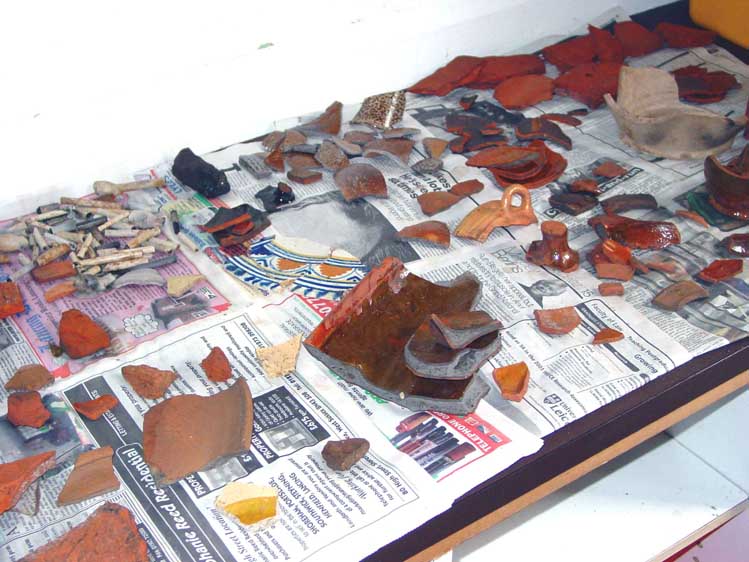
Artefacts
from the dig under the Marlipins Museum
Photograph
by Martin Snow
Click on the photograph for the full image portfolio
Adur Valley Book List
- Words
of the Week
amplexus | amplekss | n. M20. [L = embrace.] Zool. The mating position of frogs and toads, in which the male clasps the female about the back.
congener | kndn, kndin | n. & a. M18. [L, f. as CON- + gener-, genus race, stock.] A n. 1 A thing or person of the same kind or class as another. M18. 2 A by-product in the making of spirits or wines which gives the drink a distinctive character. US. M20. B adj. Congeneric; akin. M19.congenerate a. (rare) congeneric M17
tousle
| taz()l | v. & n. Also (now rare) touzle, tow-. LME. [Frequent.
of prec.: see -LE3. Cf. TUSSLE.] A v. 1 v.t. Pull about roughly, handle
(esp. a woman) roughly or rudely; disorder or dishevel (esp. the hair);
fig. abuse, maltreat. Also foll. by about, out, up. Freq. as tousled ppl
a. LME. 2 v.i. Toss oneself about; fig. rummage. M19.
1
R. P. JHABVALA Undid her hair and tousled it with her fingers. J. AIKEN
Two female figures with tousled hair.
B
n. 1 A struggle, a tussle; a romp. Sc. M18. 2 A tousled mass or mop of
hair etc. Freq. in tousle-haired, tousle-headed adjs. L19.tously a. characterized
by being tousled or dishevelled; having tousled hair or clothes: M19.
wiggly
| wli | a. colloq. E19. [f. WIGGLE v. or n. + -Y1.] Characterized
by or suggestive of wiggling movement; (of a line, pattern, etc.) having
small irregular undulations.
Blackwood's
Magazine Blacktie with a white wiggly bacterial pattern. TV Times Spawn
become wiggly tadpoles.
wont
| wnt | n. Now formal or joc. ME. [Perh. f. a conflation of it is
my wone and I am wont: see WONE n., WONT a.] What is habitual or customary;
a custom, a habit.
W.
TREVOR He would, as was his wont, walk for a mile. Nature It was the wont
to rank science among the highest pursuits. of wont arch. customary, usual.
use and wont: see USE n.
wont
| wnt | a. arch. OE. [pa. pple of gewunian: see WON v.1 Cf. WONTED,
-ED1.] 1 Familiar with or (formerly also) used to a thing, practice, or
condition. Long obs. exc. Sc. OE. 2 Accustomed, apt, liable. Usu.
foll. by to do. OE. 3 = WONTED 2. Long obs. exc. Sc. LME.
2
SIR W. SCOTT The lark was wont my matins ring. DICKENS All is going on
as it was wont. W. D. WHITNEY Such a distinction is wont to be termed 'inorganic'.
A. STORR Someone toward whom she was wont to turn for support.
---------------------------------------------------------
Excerpted
from The Oxford Interactive Encyclopedia
Developed
by The Learning Company, Inc. Copyright (c) 1997 TLC Properties Inc.
wiggly
wontins
Quaking
Grass or Totter Grass, Briza media.
Ref:
The
Natural History of the British Isles (St. Michael)
Consultant
Editor: Pat Morris
ISBN
0 600 33657 4
Image Gallery
Photograph by Ray Hamblett, edited by Andy Horton
- Tucows
Software Reviews

|
Web
Monkey :
The Web Developer's Resource
Location:
http://hotwired.lycos.com/webmonkey/
Digital
Photography Review
http://www.dpreview.com/
The default files created
have the suffix *.html so anybody using the program has to be a little
bit cautious about overwriting existing files.
Computing
Net Support Site
(for computing problems) ****
http://computing.net/windows95/wwwboard/wwwboard.html
The upsurge of EFora
on all subjects (a
few have been recommended before in these bulletins) are an important way
in which the Internet
will change the world.
A list of recommended eFora
are shown in the left hand column. Please make any suggestions.
Sussex History PASTFINDERS
Archaeology in Sussex to AD 1500 ****
WSCC
LIBRARY *****
Excellent
and essential service with a full catalogue of books, CDs, videos, on-line
renewals, book ordering.
- The
Glaucus 2000 CD-ROM includes the complete Shoreham-by-Sea
and Adur Valley web sites, as well as shareware
and free programs

ADUR VALLEY EFORUM PAGE |
Events
- Adur
On-line Events page
- http://appspace.nexus-solutions.net/arc/asp/diary/diaryoutput.asp
- Please send in any details of local events.
- Web
Sites
American
Heritage Dictionary of the English Language:
Fourth
Edition *****
- SPONSORSHIP OPPORTUNITY
For any company or organisation wanting nationwide green publicity, there is an opportunity to sponsor the journal "Glaucus" of the British Marine Life Study Society.
There remains sponsorship opportunities on the BMLSS (England) web site and other publications, including Torpedo.
Sponsorship is also available for the Adur Torpedo Electronic News Bulletin and the Shoreham-by-Sea web pages (which preceded the Adur Resource Centre web site), which would be more suitable for a local firm(s).
Web Site Design Services are available from Hulkesmouth Publishing
Normal
advertisement rules apply.
Submissions
accepted by EMail only.
|
|
|
|
| 1 |
|
State of the District Debate Discussion Groups |
| 2 |
|
State of the District Debate Discussion Groups |
| 3 |
|
Professor Richard Ivell visited Widewater Lagoon |
Adur
Torpedo was written, designed and distributed by Andy
Horton.

